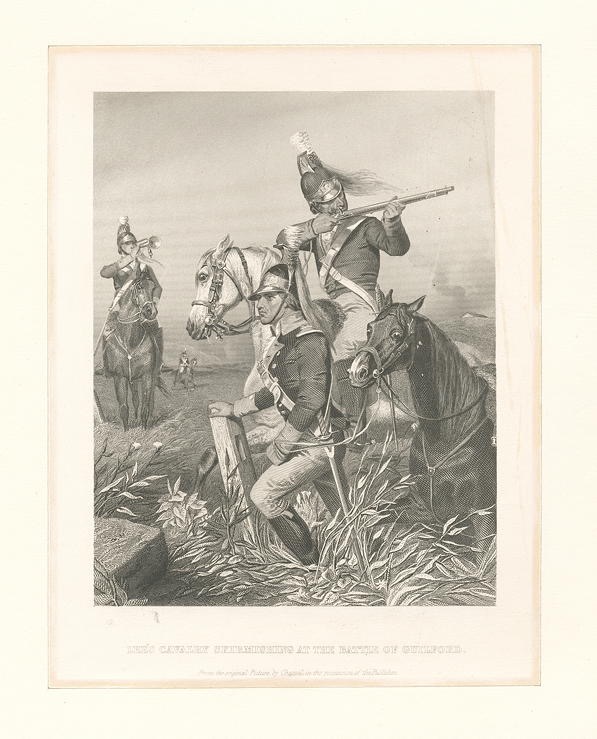Prominence

Unknown Artist: Lee's cavalry skirmishing at the Battle of Guilford.
(Print Issued 1789 - 1880)
"He left his Prominence behind."
Perhaps due to his Militia service in the Revolutionary War, my fifth great-grandfather, Flower Swift, rose to Prominence. With this came close brushes with several famous personalities. He served with distinction, though few details have been passed down. Those that survived show him to have been plucky, taking full advantage of his good fortunes. After Charleston's fall but before Camden, he was captured by a Tory patrol. As was the custom, he was disarmed and immediately paroled. Still, before he was dismissed, he overheard two British officers speaking of a planned assault on a crucial Rebel lead mine in his district. He reported this information to his officers, who passed it up the chain, clear to the offices of Virginia's Governor, Thomas Jefferson, who mustered additional militia units, appointing William Campbell, Patrick Henry's brother-in-law, to lead the expedition, and Walter Crockett, Davy's great uncle, as second in command. Swift's company most certainly fought under these in the following Battle of Guilford Courthouse, a pyrrhic victory for British forces that helped weaken the British before Yorktown. He certainly also fought at King's Mountain and in some expeditions against the Cherokee in Tennessee.
Swift served as a quartermaster when not riding or fighting. As a result of this excursion, Tory forces never again threatened Swift's corner of Virginia. Following Guilford, Campbell resigned over some disagreement with Col. Light Horse Harry Lee, Robert E.'s father, and released Swift's militia to return home before Yorktown. Upon returning, Swift became a Justice of the Peace and recruiter for the local militia, where he trained recruits and directed them to dislodge remaining British forces after Yorktown. He later became a Justice. He held that position and that of Militia Commander until around 1810, when the loss of some money placed in the care of his son Thomas, the sheriff, allegedly persuaded him to relocate to Knox County, Kentucky, where he died in 1813. His final years feature little evidence. He left his Prominence behind. His wife outlived him by twenty-five years, living until 1839. She died in Missouri, where the discredited Thomas, who was on my branch of the family tree, died just a year later. (More detail on this story in an upcoming piece.)
Swift's daughter Martha, my fourth great-grandmother, would die en route to Oregon in 1844. Martha married Major George Currin, my fourth great-grandfather, who led a company in the War of 1812, though they reportedly never saw action. As was often the case in those days, they suffered more casualties to injury, illness, and desertion than to engagement with any enemy. The war had ended by the time he'd marched across Virginia. Within a generation of Swift's departure, my part of the remaining Swift family headed West, where they would become among the earliest settlers in Oregon Territory. Swift's legacy remains there, though. When The Muse and I visited Galax, Virginia, in 2009, the receptionist at the local historical society proclaimed me a Prominent person after I explained that I descended from Flower Swift. His son's humiliation notwithstanding, the brick courthouse he built still stands there.
One more side trip a few generations back before leaving The Swifts behind. Flower's grandfather, also a Flower Swift, who originally emigrated from England, my seventh great-grandfather, worked as a constable or sheriff in Maryland. He died relatively early, reportedly while at sea, in 1742 at 42. He had married Elizabeth Whitaker in 1725 in Spesutia, Maryland. When The Muse and I were in exile, we visited the church where they were married near the present-day Aberdeen Proving Grounds in Maryland. Her mother had earlier been married there to an emancipated servant named Edward Tegg (Teague), an eighth great-grandfather, and one with a remarkable story I'll consider in the next installment, OddEnds.
©2024 by David A. Schmaltz - all rights reserved


